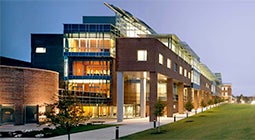Rensselaer Polytechnic Institute and the Icahn School of Medicine at Mount Sinai have launched the Center for Engineering and Precision Medicine (CEPM), one of the first centers in the nation to bridge engineering and engineering science with medicine.
Based in New York City with research also occurring at the Rensselaer campus in Troy, New York, the jointly managed Center will drive advances in point-of-care and point-of-use devices and diagnostics; microphysiological platforms for discovery and diagnosis; robotic surgery; biomedical imaging; therapeutics biomanufacturing; and artificial intelligence and machine learning applied to biomedical data. These engineering advances will improve quality of life by synergizing state-of-the-art expertise in research and education at the nexus of engineering and medicine.
The Center for Engineering and Precision Medicine is the historic outgrowth of collaborative work among Rensselaer and Icahn Mount Sinai researchers in the field of precision medicine, a personalized approach to disease treatment and prevention based on individuals’ biological, environmental, and lifestyle differences. Precision medicine is already transforming medical practices in areas such as cancer immunology, neuroinflammation and disease, and regenerative and reparative medicine. The CEPM will accelerate this transformation and develop new technologies that will revolutionize the way patient care is delivered.
Based in midtown Manhattan, the CEPM will focus on three critical research areas at the interface of engineering and medicine:
- Neuro-engineering, which exploits minimally invasive control and regulation of neural circuitry to target neurodegenerative diseases; brain-computer/network analysis; neuro-diagnostics; and computational neurobiology.
- Immuno-engineering, which focuses on developing designer immune cells; microbiome engineering; on-demand anti-infectives; and synthetic vaccines to help our bodies fight cancer and infectious disease.
- Regenerative and reparative medicine, which encompasses on-demand personalized tissue repair and regeneration; organoids (3D tissue culture that mimics simplified organ function); and cellular reprogramming.
The joint Center for Engineering and Precision Medicine is also developing new academic programs to help students earn joint, dual, or individual doctorates from Rensselaer and Mount Sinai. The programs, which will be reinforced by the biotechnology and life science research already taking place at the Rensselaer campus, include a joint Ph.D. in engineering and precision medicine, a Ph.D. in the School of Engineering or School of Science at Rensselaer with a concentration in engineering and precision medicine, and a Ph.D. with a combined master’s degree or certificate in entrepreneurship.
Center Leadership
The Center for Engineering and Precision Medicine is jointly staffed by Rensselaer and Mount Sinai.
Directors
Jonathan S. Dordick, Ph.D.
Dr. Dordick is Special Advisor to the President and Institute Professor of Chemical and Biological Engineering at Rensselaer.
Priti Balchandani, Ph.D.
Dr. Balchandani is Professor, Diagnostic, Molecular, and Interventional Radiology; Neuroscience; Psychiatry; Director, Advanced Neuroimaging Research Program at the BioMedical Engineering and Imaging Institute
Rensselaer Polytechnic Institute
Deepak Vashishth, Ph.D.
Director, Center for Biotechnology and Interdisciplinary Studies; Professor of Biomedical Engineering
Dorit Nevo, Ph.D.
Acting Vice Provost and Dean for Graduate Education
Icahn Mount Sinai
Zahi A. Fayad, Ph.D.
Director, BioMedical Engineering and Imaging Institute; Professor, Diagnostic, Molecular, and Interventional Radiology, Medicine (Cardiology), AI and Human Health
Scott Friedman ’76, MD
Dean, Therapeutic Discovery; Fishberg Professor of Medicine; Professor, Pharmacology and Systems Therapeutics; Chief, Division of Liver Diseases

